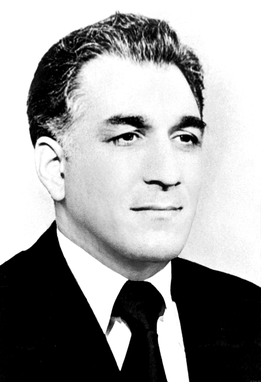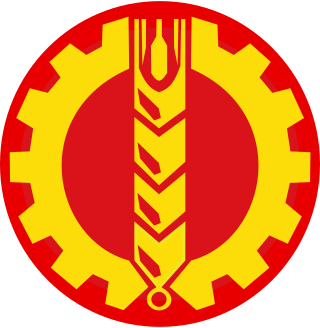Related Research Articles

Babrak Karmal was an Afghan communist revolutionary and politician who was the leader of Afghanistan, serving in the post of general secretary of the People's Democratic Party of Afghanistan from 1979 to 1986.

Hafizullah Amin was an Afghan communist head of state, who served in that position for a little over three months, from September 1979 until his assassination. He organized the Saur Revolution of 1978 and co-founded the Democratic Republic of Afghanistan (DRA), ruling Afghanistan as General Secretary of the People's Democratic Party.

Mohammad Najibullah Ahmadzai, commonly known as Dr. Najib, was an Afghan politician who served as the General Secretary of the People's Democratic Party of Afghanistan, the leader of the one-party ruling Republic of Afghanistan from 1986 to 1992 and as well as the President of Afghanistan from 1987 until his resignation in April 1992, shortly after which the mujahideen took over Kabul. After a failed attempt to flee to India, Najibullah remained in Kabul. He lived in the United Nations headquarters until his assassination during the Taliban's capture of Kabul.

The Democratic Republic of Afghanistan (DRA), renamed the Republic of Afghanistan in 1987, was the Afghan state during the one-party rule of the People's Democratic Party of Afghanistan (PDPA) from 1978 to 1992. It relied heavily on assistance from the Soviet Union for most of its existence, especially during the Soviet–Afghan War.

The People's Democratic Party of Afghanistan (PDPA) was a Marxist–Leninist political party in Afghanistan established on 1 January 1965. Four members of the party won seats in the 1965 Afghan parliamentary election, reduced to two seats in 1969, albeit both before the party was fully legal. For most of its existence, the party was split between the hardline Khalq and moderate Parcham factions, each of which claimed to represent the "true" PDPA.
The following lists events that happened during 1986 in Afghanistan.

Sultan Ali Keshtmand, sometimes transliterated Kishtmand, was an Afghan communist politician, belonging to the Parcham faction of the People's Democratic Party of Afghanistan (PDPA). He served twice as Chairman of the Council of Ministers during the 1980s, from 1981 to 1988 and from 1989 to 1990 in the Democratic Republic of Afghanistan.

Khalq was a faction of the People's Democratic Party of Afghanistan (PDPA). Its historical de facto leaders were Nur Muhammad Taraki (1967–1979), Hafizullah Amin (1979) and Sayed Mohammad Gulabzoy (1979–1990). It was also the name of the leftist newspaper produced by the same movement. The Khalq wing was formed in 1967 after the split of the party due to bitter resentment with the rival Parcham faction which had a differing revolutionary strategy.
Wakil Ahmad Muttawakil Abdul Ghaffar is an Afghan politician who has been a member of the militant Taliban organization. He was the Taliban foreign minister from 27 October 1999 in their first Islamic Emirate of Afghanistan rule, until the Taliban were deposed in late 2001. Prior to this, he served as spokesman and secretary to Mullah Mohammed Omar, leader of the Taliban. After the Northern Alliance, accompanied by U.S. and British forces, ousted the regime, Muttawakil surrendered in Kandahar to government troops.

The Northern Alliance, officially known as the United Islamic National Front for the Salvation of Afghanistan, was a military alliance of groups that operated between early 1992 and 2001 following the dissolution of the Soviet Union. At that time, many non-Pashtun Northerners originally with the Republic of Afghanistan led by Mohammad Najibullah became disaffected with Pashtun Khalqist Afghan Army officers holding control over non-Pashtun militias in the North. Defectors such as Rashid Dostum and Abdul Momim allied with Ahmad Shah Massoud and Ali Mazari forming the Northern Alliance. The alliance's capture of Mazar-i-Sharif and more importantly the supplies kept there crippled the Afghan military and began the end of Najibullah's government. Following the collapse of Najibullah's government the Alliance would fall with a Second Civil War breaking out however following the Islamic Emirate of Afghanistan's (Taliban) takeover of Kabul, The United Front was reassembled.
Abdul Rahim Hatif was a politician in Afghanistan. He served as one of the vice presidents during the last years of the Democratic Republic of Afghanistan.

Mohammad Hasan Sharq is an Afghan former communist politician who was active in the communist government of Afghanistan. Sharq became Chairman of the Council of Ministers – the government of the Soviet-backed Democratic Republic of Afghanistan. He was selected as a compromise candidate after a loya jirga ratified a new constitution in 1987. However, the power of his office was relatively slight compared with the powers held by the presidency.

Colonel General Abdul Kadir Dagarwal was an Afghan politician, diplomat, and a military officer in the Afghan Air Force who participated in the coup d'état that created the Republic of Afghanistan under the President Dawood Khan, and later directed the Afghan Air Force and Army Air Corps squadrons that attacked the Radio-TV station during the Saur Revolution.

Mohammad Aslam Watanjar was an Afghan military officer and politician. He played a significant role in the coup in 1978 that killed the Afghan President Mohammad Daoud Khan, starting the Saur Revolution. Watanjar later became a member of the politburo in the Soviet-backed Democratic Republic of Afghanistan.

The 1989–1992 Afghan Civil War, also known as the FirstAfghan Civil War, took place between the Soviet withdrawal from Afghanistan and the end of the Soviet–Afghan War on 15 February 1989 until 27 April 1992, ending the day after the proclamation of the Peshawar Accords proclaiming a new interim Afghan government which was supposed to start serving on 28 April 1992.
The following lists events that happened during 1987 in Afghanistan.

The Revolutionary Council of the People's Democratic Party of Afghanistan (PDPA) ruled the Democratic Republic of Afghanistan from 1978 until its collapse in 1992. The council was the supreme state power under the communist regime and was a carbon copy of the Supreme Soviet in the Soviet Union. The point with the council was to convene on a semiannual basis to approve decisions made by the presidium.
General Mohammad Nabi Azimi. was the Deputy Defense Minister of the Democratic Republic of Afghanistan (DRA) who played a critical role in the fall of President Mohammad Najibullah. General Mohammad Nabi Azimi was an ethnicMohammadzai who belonged to the Parcham faction of the People's Democratic Party of Afghanistan. He was also the ambassador to the United Kingdom.
Abdul Wahed Sarābi, is a former government minister and was one of the vice presidents of Mohammad Najibullah in Afghanistan.

The 1990 Afghan coup d'etat attempt occurred on March 6, 1990, when General Shahnawaz Tanai, a hardline communist and Khalqist who served as Minister of Defence, attempted to overthrow President Mohammad Najibullah of the Republic of Afghanistan. The coup attempt failed and Tanai was forced to flee to Pakistan.
References
- 1 2 3 4 Twin Cities Daily Planet. MINNESOTA VOICES | Dr. Ghafar Lakanwal
- 1 2 Jonathan Steele (2011). Ghosts of Afghanistan: Hard Truths and Foreign Myths . Counterpoint. p. 81. ISBN 978-1-58243-787-3.
- 1 2 Intercontinental Press. Intercontinental Press. January 1982. p. 187.
- ↑ Anthony Arnold. Afghanistan's Two-Party Communism: Parcham and Khalq. Hoover Press. p. 196. ISBN 978-0-8179-7793-1.
- 1 2 S. Fida Yunas (1998). Afghanistan: Organization of the Peoples Democratic Party of Afghanistan/Watan Party, Governments and Biographical Sketches 1982-1998. p. 11.
- 1 2 LA Times. Afghanistan Ousts 2 Cabinet Ministers
- ↑ Near East/South Asia Report, ed. 86111. Foreign Broadcast Information Service. 1986.
- 1 2 The Concept. Raja Afsar Khan. 1989.
- 1 2 LA Times. 2 Afghan Officials Defect, May Seek U.S. Asylum
- ↑ InsightNews.com. Local non-profit closes its doors after 18 years of promoting diversity and inclusion Archived June 6, 2014, at the Wayback Machine